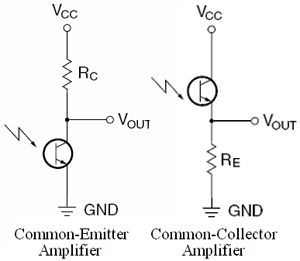Difference between revisions of "Photodiodes and Phototransistors"
From Mech
Jump to navigationJump to searchm |
m |
||
| Line 6: | Line 6: | ||
*'''Commond-Collector Amplifier''' - goes from "low" to "high" with light. |
*'''Commond-Collector Amplifier''' - goes from "low" to "high" with light. |
||
The phototransistor can be used in two different modes: 1) active & 2) switch. These modes are controlled by changing the value of the resistor. The equations are: |
The phototransistor can be used in two different modes: 1) active & 2) switch. These modes are controlled by changing the value of the resistor. The equations are: |
||
| Line 17: | Line 16: | ||
*'''Active Mode''' - In active mode, the output of the transistor is proportional to the intensity of the light. |
*'''Active Mode''' - In active mode, the output of the transistor is proportional to the intensity of the light. |
||
==Photodiodes== |
|||
==Comparison== |
|||
* '''Frequency Response''' |
|||
*; Photodiodes are much faster than phototransistors |
|||
* '''Gain''' |
|||
*; Phototransistors have a higher gain |
|||
==Applications== |
|||
==References== |
==References== |
||
Revision as of 14:40, 6 July 2006
Phototransistors
Phototransistors are transistors with the base terminal exposed. Instead of applying a voltage to the base, the photons from striking light activate the transistor. Other than that, the phototransistor behaves just like a normal transistor. Two common configurations are shown on the right.
- Common-Emitter Amplifier - goes from "high" to "low" with light.
- Commond-Collector Amplifier - goes from "low" to "high" with light.
The phototransistor can be used in two different modes: 1) active & 2) switch. These modes are controlled by changing the value of the resistor. The equations are:
Fairchild recommends a 5kohm resistor or greater to use as a switch
- Switch Mode - when operating as a switch, the transistor can be switched between the cut-off ("off") and saturated ("on") states. This means that when light strikes the phototransistor, it will conduct. Otherwise, it will insulate.
- Active Mode - In active mode, the output of the transistor is proportional to the intensity of the light.
Photodiodes
Comparison
- Frequency Response
- Photodiodes are much faster than phototransistors
- Gain
- Phototransistors have a higher gain
Applications
References
- Fairchild Semiconductor, "Design Fundamentals for Phototransistor Circuits," PDF,

